青少版新概念2A unit 2 知识点总结
新概念英语青少版_2A_unit_2
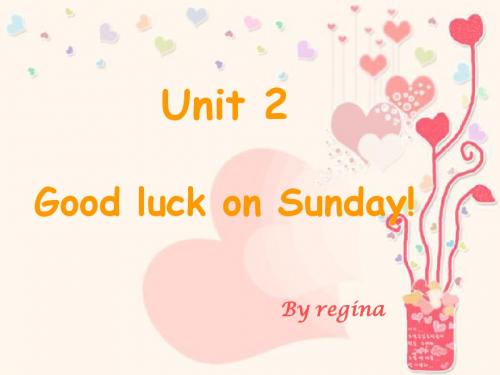
• • • • • • • • • • • •
New Words and Expressions: luck n. 运气 laugh v. 大笑 reporter n. 记者 competitor n. 竞争者 centre n. 中心 listener n. 听众 visit v. 参观,访问 look forward to期望,盼望 trade fair n. 贸易博览会 spirit n. 精神 noisy adj. 嘈杂的,喧闹的 film n. 电影 hundreds of 数以百计的 say v. 说 exhibitor n. 参展者 town n. 市镇,城镇 thousands of数以千计的 city n. 城市 visitor n. 参观者 village n. 村庄
Imagine you are a radio or TV reporter,and you are talking to one of the runners in the Marathon. What questions can you ask him or her? 假设你是一名电台记者,或电视台记 者,你正在与一名马拉松参赛者谈话。你 会问他或她什么问题?
Unit 2
Good luck on Sunday!
By regina
Marathon
•世界上最 长的跑步 项目—— 马拉松赛 跑
reporter
BBC,英国广播公司(British Broadcasting Corporation),是英国的一家政府资助但却独立运 作的媒体,长久以来一直被认为是全球最受尊敬的媒 体之一。在相当长的一段时间内BBC一直垄断着英国 的电视、电台。在1955年独立电视台和1973年独立电 台成立之前,BBC一直是全英国唯一的电视、电台广 播公司。今天BBC除了是一家在全球拥有高知名度的 媒体,还提供其他各种服务,包括书籍出版、报刊、 英语教学、交响乐团和互联网新闻服务。
青少版新概念2B知识点总结

青少版新概念2B知识点总结Unit 1: Personal Information- Basic personal information, including name, age, nationality, and occupation.- The verb "to be" for describing characteristics and states.- Asking and answering questions about personal information.Unit 2: Daily Routine- Vocabulary related to daily routine activities.- Present simple tense for talking about regular activities.- Expressing likes and dislikes.- Describing frequency using adverbs of frequency.Unit 3: Weather and Seasons- Vocabulary related to weather and seasons.- Present continuous tense for talking about current weather conditions.- Describing seasons and weather changes.Unit 4: Hobbies and Interests- Vocabulary related to hobbies and interests.- Talking about favorite activities and pastimes.- Expressing preferences and opinions.- Using "would like" to express desires.Unit 5: Family and Relationships- Vocabulary related to family members.- Possessive adjectives for indicating relationships.- Talking about family members and relationships.- Describing appearance and personality.Unit 6: Daily Activities- Vocabulary related to daily activities.- Present simple tense for talking about habits and routines. - Talking about household chores and responsibilities.- Expressing ability and inability.Unit 7: Food and Eating Habits- Vocabulary related to food and eating habits.- Talking about favorite foods and meals.- Describing food preferences and tastes.- Countable and uncountable nouns for food items.Unit 8: Shopping- Vocabulary related to shopping and clothing.- Making requests and asking for help.- Talking about clothing preferences and sizes.- Describing colors and patterns.Unit 9: Travel and Holidays- Vocabulary related to travel and holidays.- Talking about travel experiences and destinations. - Making plans and discussing itineraries.- Asking for and giving directions.Unit 10: Health and Fitness- Vocabulary related to health and fitness.- Giving advice and expressing concerns.- Describing healthy and unhealthy habits.- Talking about electronic gadgets and their functions.- Expressing opinions about technology.Unit 12: School and Education- Vocabulary related to school and education.- Talking about school subjects and activities.- Describing school facilities and routines.- Expressing likes and dislikes about school.Unit 13: Jobs and Professions- Vocabulary related to jobs and professions.- Talking about different professions and work environments. - Describing job responsibilities and skills.- Discussing career aspirations.Unit 14: Sports and Activities- Vocabulary related to sports and activities.- Talking about favorite sports and physical activities.- Expressing abilities and talents in sports.- Describing sports equipment and rules.Unit 15: Places and Buildings- Vocabulary related to places and buildings.- Talking about different types of places and their functions. - Describing buildings and their appearances.- Giving directions to specific locations.Unit 16: Entertainment and Leisure- Vocabulary related to entertainment and leisure activities. - Talking about leisure time activities and hobbies.- Discussing different forms of entertainment.- Expressing preferences for different types of entertainment.Unit 17: Transportation and Travel- Vocabulary related to transportation and travel.- Talking about different modes of transportation.- Describing travel experiences and preferences.- Asking and giving information about travel arrangements.Unit 18: Describing People and Places- Adjectives for describing people's appearance and personality.- Describing places and locations.- Discussing personal experiences and observations.Unit 19: Daily Life and Culture- Vocabulary related to daily life and cultural customs.- Talking about cultural traditions and customs.- Describing daily life routines and activities.- Expressing opinions about cultural differences.Unit 20: Review- Review of key vocabulary and grammar points from previous units.- Consolidating knowledge and reviewing important concepts.以上是《青少版新概念2B》课程的知识点总结。
青少版新概念2a unit2
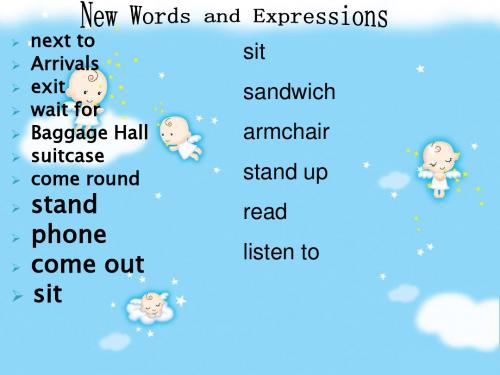
news n.新闻 come home 回家 television n.电视 quiet adj.安静的 say v. 说
1, speak意为‘说,讲’其后常跟某种 语言 2,tell着重把一件事情通知或告诉别人
tell sb sth/ tell sb to do sth 3, say 侧重说话的内容 4,talk 意为‘谈话’跟宾语时,与 to,with,about连用
n
V-ing
look up 向上看,查找 look after 照顾 look for 寻找 look like 看起来像 look through 浏览 look around 环视
Maggie wanted an evening job that would allow her to( ) her son during the day
7. Let’s的反意疑问句shall we
Let’s have a rest, _____s__h_a_l_l _w_e_? (包括听话者) Let us have a rest, ____w__il_l_y_o_u___? (不包括听话者)
1. 判定(判断该用肯定还是否定); 2. 找动(找句子的助动词:be用be,动词原形do, 三单does,过去did,完成have); 3. 换代(将主语换为代词);
1 There is a pen on the chair,__is_n_’t_t_h_e_re___?
2 There are 60 students in our class, __a_re_n_’_t _th_e_re____?
3 There was nothing in the fridge,___w__as__th_e_r_e___?
最新新概念青少版2A复习总结(语法)

新概念2A总复习Part 1 时态1、基本结构:be+doing (do代指所有动词原形)肯定句:主语+am/is/are+doing......My mother is talking with the dentist.否定句:主语+am/is/are not+doing...They aren’t playing games.一般疑问句:Is/Are+主语+doing...? Yes,主语+am/is/are...Is she waiting for a bus? No,主语+am/is/are not.特殊疑问句:特殊疑问词+is/are+主语+doing....?Where are they doing their homework?2、动词现在分词变化规则:1)一般情况下,直接在动词后加-ingwork ---- working sleep ----- sleeping study ----- studying2) 动词以不发音的-e结尾,要去-e加-ingtake ----- taking make ----- making dance ----- dancing3) 重读闭音节的动词,要双写词尾字母,再加-ingcut ----- cutting put ----- putting begin ------ beginning4) 以-ie结尾的动词,把变成y再加-inglie ----- lying tie ----- tying die ----- dying①表示客观事实、真理②经常发生、有规律的事情1、基本结构:①带有be动词: 主语+am/is/are+肯定句:主语+am/is/are+n./adj./prep.短语...The sky is blue.My music book is in the bag.否定句:主语+am/is/are not+n./adj./prep.短语...It isn ’t my magazine.The curtain isn ’t clean.一般疑问句:Is/Are+主语+n./adj./prep.短语...? Yes,主语+am/is/are.Are these gloves yours? No,主语+am/is/are not. Is there any water in the jug ?特殊疑问句:特殊疑问词+is/are+主语+n./adj./prep.短语....?Which one is right?Who is the man in a black hat?带有实义动词:主语+(never/sometimes/often/usually/always )v.原形/v.三单+....(every morning/day/week.)肯定句:主语+v.原形/三单+.......They usually live in dry places.It sometimes rains in summer.否定句:主语+don ’t /doesn ’t +v.原形+.......We don ’t go to school on weekends.Linda doesn ’t walk to school, but she goes by car.一般疑问句:Do/Does+主语+v.原形.......? Yes,主语+do/does.Do you always arrive at school very early? No,主语+don ’t/doesn ’t. Does Lucy have a rest every afternoon?特殊疑问句:特殊疑问词+do/does+主语+v.原形.......?Why does she always arrive so late?2、动词第三人陈单数变化规则:1)一般直接在动词尾直接加s.如:play—plays, want—wants, work—works,know—knows,help—helps, get—gets2)以字母s、x、ch、sh结尾的动词加-es 发音/iz/;如:guess—guesses,fix—fixes,teach—teaches,brush—brushes,watch—watches,catch—catches3)以辅音字母+y结尾的动词,先变y为i,再加-es.发音/z/如:study—studies,carry—carries,fly—flies,worry—worries1、学生们在干什么?有一些在打电话,另一些躺在沙滩上。
新概念青少版2A unit 2 Good luck on Sunday!

There are hundreds of exhibitors and thousands of visitors here.
课文注释
成百上千的, 数以计百的 结构
♪ R: Paul, please tell our _________ listeners . first Marathon, isn’t it? ♪ This is your _____ ♪ P: Yes, it is.
Good luck on Sunday!
looking forward to Sunday? ♪ R: Are you _______________ ♪ P: Yes, I am. spirit , Paul! ♪ R: That’s the ______ Good luck on Sunday! ♪ __________
2 1
2
3 5
Yes, they are.
Are you looking forward to Sunday?
非常期待某事 结构
课文注释
look forward to + 名词/ 动名词
介词
look look look look look look look look look look look after 照料 ahead 向前看,着眼未来 at 看着 as if 看上去好像 around/ about 四处看看/四下环顾 back 回头看,回顾 into 朝…看,调查 on 旁观,观望 like 看上去像 out 当心,小心,留神 up 查阅,查找,抬头看
青少版新概念英语2AUnit2

Unit 2Good luck on Sunday!reporterLondon’s Docklands(多克兰)London' s DocklandsExCel Centremarathon马拉松赛跑; 耐⼒的考验Expo=Exposition(展览)Marathon ExpoHow many competitors are there?Thousands of competitors.(成千上万)trade fairtrade fairexhibitorfilmvillagelook forward tolaughradiotelevisionluck reporter centre visit trade fair noisy hundreds of exhibitor thousands of运⽓记者中⼼参观,访问贸易博览会嘈杂的,喧闹的数以百计的参展者数以千计的visitor 参观者 village 村庄 laugh ⼤笑 competitor 竞争者,参赛者 listener 听众 look forward to 盼望,期望 spirit 本质,精神film 电影 say 说 town 市镇,城镇 city 城市中⼼访问4 贸易博览会5 嘈杂的63记者2根据汉语说出英语单词.运⽓1数以千数以百计的8 计的7听众盼望4 本质5 电影63竞争者2根据汉语说出英语单词.⼤笑1 市镇8说7look forward to spiritlistener根据英语说出汉语意思.laughreporterLondon’s Docklands Marathon ExpoPaul BruceGood luck on Sunday!R: My name' s Tom French. I' m speaking to you from the ExCel Centre in London' s Docklands. We are visiting this year' s Marathon Expo.Good luck on Sunday!R: This is the Trade Fair of the LondonMarathon. It' s very noisy! There are hundreds of exhibitors and thousands of visitors here.Good luck on Sunday!R: This is a big international event. But it' s like a village! People are talking and laughing like old friends.Good luck on Sunday!R: I' m standing with one of the competitors. Let me introduce Paul Bruce. Hi, Paul! P: Hi, Tom!Good luck on Sunday!R: Paul, please tell our listeners. This is your first Marathon, isn' t it? P: Yes, it is.Good luck on Sunday!R: Are you looking forward to Sunday? P: Yes, I am. R: That' s the spirit, Paul! Good luck on Sunday!What is she doing?She is looking at the blackboard.Unit5 33What is he doing?He is eating some meat.Unit534What is he doing?He is listening to her.Unit535I am drinking tea.What are you doing?Unit536选择填空. D 1.My mother is _____TV. A.looking at B.seeing C.reading D.watching C 2.---____you ____a book? ---Yes,I am.A.Do,readB.Are ,readC.Are ,readingD.Are ,looking D 3.Kate _____,the others _____. A.sing,listen B.is singing,is listening C.sing,are listening D.is singing,are listeningA 1.She____two daughters. A. has B. does have C. have D. havesB 2.There are two_____in the house. A. family B. families C. familys D. home A 3.My father and mother____teachers. A. are B. is C. do D. does 4.They are ____ D Jenny’s family. A. ?B. aC. anD. the 6.What is your uncle? He is ____officer. B A. a B. an C. the D. ?D doing ____homework now. 8.Kate and I ___ A. am,their B. are their C. is our D. are our C 9.My father and mother are____.A. Buses driverB. busesdrivers C. bus drivers D. bus driver 10.They are talking____today’s newspaper. D A. To B. with C. of D. about D 11.Do you like_____on the grass? A.To sit B. siting B. C. sitting D. both A and C D 12.This is the way____our hair. A.That we comb B. to comb B.C. of combing D. all the above选择适当的动词,⽤动词的适当形式填空watch comb梳 have play talk get take say come listen1.Lily says”I have _____three markers and my sister ____ has one” listen to the radio after lunch.2.I want to_______3.She ______ combs her hair in the morning after she gets ____ up. playing4.Miss Zhang is________on the computer with Jenny. have5.I _______milk and bread for my breakfast everyday.are working 1. We __________( work ) on a farm now.is knocking 2. Listen! Someone __________ (knock)at the door.isn’t reading 3. Lucy ___________( not read) at the moment.4.Where are they? They ___________ (run) are running outside.Unit541⼀.⽤所给动词的适当形式填空. is running 1.Look! The cat ____________(run) up the tree. having (have) breakfast. 2.The twins are __________ 3.-___he ________ Is cleaning (clean) the blackboard? ----No, he isn’t.is playing(play)the piano in the 4.Tom__________ room. Please ask him to come here. are singing (sing) in the 5.Listen! They____________ classroom.⽤所给动词的适当形式填空6.It’s 6 o’clock in the morning. are having They_____________ ( have) their breakfast.7.My father is over there. cleaning (clean) his car. He is __________8. -Can I speak to Mr Smith ? -I’m afraid not(恐怕不⾏). He_________ is having (have) a meeting at the moment.9. Look! Some students ____________(run) there. are running 10. What ___the _____(do) there? are boys and girls doingUnit5 43⼆. ⽤下列单词,构成含有现在进⾏时的句⼦.1. Bill, eat, some, leaves, now. Bill is eating some leaves now ___________________________2.Lily,play, with ,her, friends? Is Lily playing with her friends? ___________________________3.I,talk, to ,a, policeman. I am talking to a policeman. ________________________4.the,children,wait,for, a, bus. The children are waiting for a bus.__________________________ 5.a,boy,read,an,interesting,book. A boy is reading an interesting book._________________________________Unit5 44句型转换1.We live in China.(就画线部分提问)Where do you live?2.I have no brothers.(同义句) I don’t have any brothers.3.My father is a worker. (就画线部分提问) What is your father?What does your father do?4.I will have a birthday party.(变为⼀般疑问句)Will you have a birthday party?5.The boy is laughing.(就画线部分提问)What is the boy doing?6.The old man has no children. (同义句)The old man doesn’t have any children. 7.We are listening to the radio. (就画线部分提问) What are you listening to? 8.She is fifteen years old. (就画线部分提问) How old is she?三.把下⾯的汉语翻译成英语.1、我的妈妈正在做早饭。
青少版新概念2A__Unit2_Good_luck_on_Sunday!
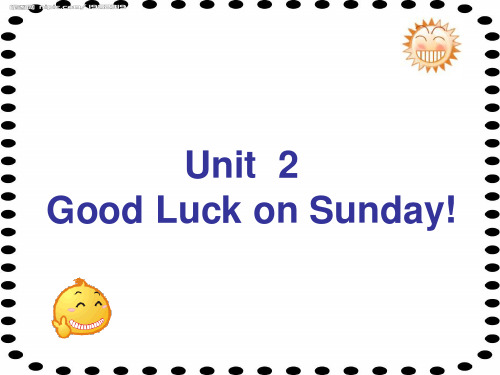
listener
根据英语说出汉 语意思. 语意思
laugh
Homework
1.听MP3:U1_U2背U2听力理解图 听 听力理解图1 背 听力理解图 2.完成 完成P17听力和选择填空 完成 听力和选择填空
星期天 星期一 星期二 星期三 星期四 星期 贸易博 览会5 嘈杂的
6
记者2 记者
根据汉语说出英 语单词. 语单词
运气1 运气
数以千 数以百 计的8 计的7
听众
3
盼望4 本质5 电影6 说7
竞争者
2
根据汉语说出英 语单词. 语单词
大笑1 市镇8
look forward to spirit
marathon
马拉松赛跑; 马拉松赛跑 耐力的考验
this year’s ‘s 与表示一段时间的名词连用, 与表示一段时间的名词连用, 表示某物属于某段时间, 表示某物属于某段时间,如: today’s ,this week‘s last year’s
This is the Trade Fair of the Bei 贸易博览会) (贸易博览会) Jing Marathon.
Expo=Exposition
(展览) 展览)
The Trade Fair of the London Marathon 定冠词在特定的语境中表 示特指。 示特指。
动词 v.
+or
名词 n.
visit (参观)—— visitor (参观者) 参观) 参观者) exhibitor (参展者) exhibit(参展)—— ________________(参展者) 参展) competitor(竞争者) compete(竞争) —— ________________(竞争者) 竞争) +er speak —— speaker listen —— listener teach —— teacher sing —— singer
新概念青少版2A_Unit2

village 村庄 villager 村民
trade fair 贸易会
trade fair 商品交易会
exhibitor 参展者
Excel Centre 卓著中心(英国) visiting this year’s Marathon Expo 正参观今年的马拉松博览会
Trade Fair of the London Marathon 伦敦马拉松贸易展览会 very noisy 非常嘈杂的 hundreds of exhibitor 数以百计的参赛者
• They are listening to the radio.
learn 学习
• Are those students learning French?
• No, they aren’t.
• What are they learning?
• They are learning English.
come home 回家
• Are William and Karen _____c_om__in_g_h_o_m_e_______?
• No, __a_r_e_n_’t____.
• What __a_re__th_e_y__d_o_in_g__?
• _T_h_e_y_a_r_e_g_o_i_n_g_o_u_t_.
Fair.
London’s Docklands
(多克兰)
知识回顾 Knowledge Review
Robert and Lucy are _________ for a bus. Polly and Annie are _________ to the radio. Those students are _________ English. Paul and Claire are _________ the news. Paul and his friends are ________ football. Nina and Daisy are __________ lunch. William and Karen are __________ out. Those people are __________ to the Trade
新概念英语青少版2A unit2
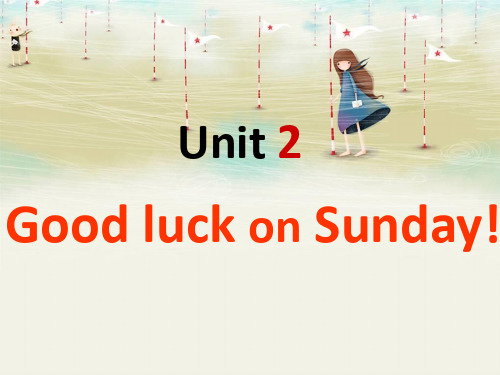
1.on Sunday—on+日期或星期,表示时间。例如:on May 1:5月1日 2.I’m speaking---第一人称现在进行时;现在进行时表示现在正在进行的 事件。
现在进行时的构成: 主语+be动词(am, is, are)+动词ing形式(现在分词)
Good luck on Sunday!
outside.
Unit5 26
用所给动词的适当形式填空
5.It’s 6 o’clock in the morning. They_____________ ( have) their breakfast. 6.My father is over there. He __________ (clean) his car. 7. -Can I speak to Mr Smith ? -I’m afraid not(恐怕不行). He_________ (have) a meeting at the moment. 8. Look! Some students ____________(run) there.
New Words and Expressions生词和短语
好运
reporter 记者
report 报道
centre 中心
visit
参观,访问
visitor
trade fair 贸易会
trade fair 商品交易会 exhibitor 参展者
noisy
嘈杂的
marathon 马拉松赛跑
thousands of 数以千计的
hundreds of 数以百计的
village 村庄
villager 村民
competitor 竞赛者,参赛者
青少版新概念2A_unit2(共50页)
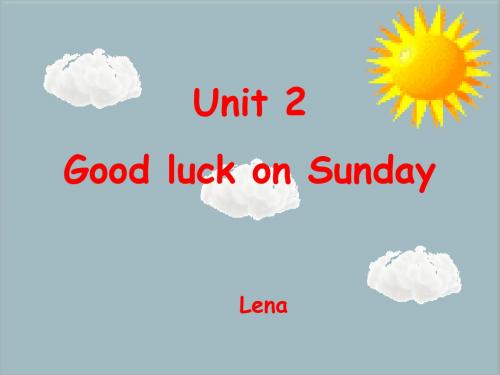
Practice
1、That is not my dog. It is ____L_i_n_d_a_’_s____ (Linda). 2 2、The library has many __c_h_i_ld_r_e__n_’s__ (children) books.0 3、She studies at a ___g_ir_l_s_’__ (girl) school nearby. 5 4、I met __K__ik_i_’s___ (Kiki) mother in the market. 2 5、Those _s_t_u__d_e_n_t_s_’_ (students) classroom is over ther2e.
who
be
listen to
What is going up?
Who is he? He’s Tom French. What's his job? He is a repoter.
Reporter:
My name's Tom French.
I’m __sp_e_a_k_i_n_g__ to you from the ExCel Centre in
7、Is Linda icsomcoimnginoguotuntonwowitwhithehresruistuciatcseas,eo.r not? Yes, she is.
Review
1、I’m in the coffee bar ___C____ the Arrivals exit.
A. for
B. into
C. next to
D. at
2、Where are you, and what ___D____ ?
A. do you do B. you do C. you doing D. are you doing
新概念青少版2A各单元重点归纳
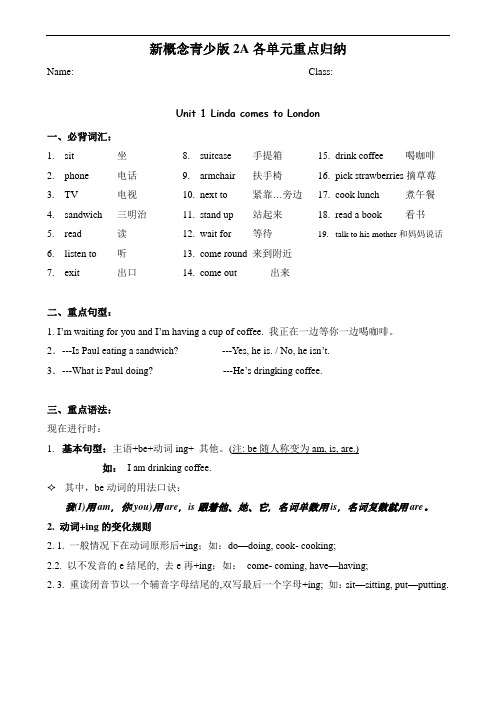
新概念青少版2A各单元重点归纳Name:___________________ Class:___________________Unit 1 Linda comes to London一、必背词汇:1.sit 坐2.phone 电话 电视4.sandwich 三明治5.read 读6.listen to 听7.exit 出口8.suitcase 手提箱9.armchair 扶手椅10.next to 紧靠…旁边11.stand up 站起来12.wait for 等待e round 来到附近e out 出来15.drink coffee 喝咖啡16.pick strawberries摘草莓17.cook lunch 煮午餐18.read a book 看书19.talk to his mother和妈妈说话二、重点句型:1. I’m waiting for you and I’m having a cup of coffee. 我正在一边等你一边喝咖啡。
2.---Is Paul eating a sandwich? ---Yes, he is. / No, he isn’t.3.---What is Paul doing? ---He’s dringking coffee.三、重点语法:现在进行时:1.基本句型:主语+be+动词ing+ 其他。
(注: be随人称变为am, is, are.)如:I am drinking coffee.其中,be动词的用法口诀:我(I)用am,你(you)用are,is跟着他、她、它,名词单数用is,名词复数就用are。
2. 动词+ing的变化规则2. 1. 一般情况下在动词原形后+ing;如:do—doing, cook- cooking;2.2. 以不发音的e结尾的, 去e再+ing;如:come- coming, have—having;2. 3. 重读闭音节以一个辅音字母结尾的,双写最后一个字母+ing; 如:sit—sitting, put—putting.Unit 2 Good luck on Sunday!一、重点词汇:1.visit 参观,访问2.visitor 参观者3.noisy 嘈杂的4.village 村庄ugh 大笑6.film 电影7.say 说话8.town 市镇,城镇9.city 城市10.radio 收音机11.learn 学习12.news 新闻13.quiet 安静的14.television 电视机15.luck 运气16.center 中心e home 回家18.listen to the radio听收音机19.learn English 学习英语20.watch the news 看新闻21.play football 踢足球22.have lunch 吃午餐23.go out 外出24.hundreds of 数以百计的25.thousands of 数以千计26.look forward to 盼望,期望二、重点句型:1. --- Are Robert and Lucy waiting for a taxi? 罗伯特和露西在等出租车么?---Yes, they are. / No, they aren’t.2. ---What are Robert and Lucy doing? 罗伯特和露西在做什么?--- They are waiting for a bus. 他们正在等公交车。
新概念青少版2A各单元重点归纳
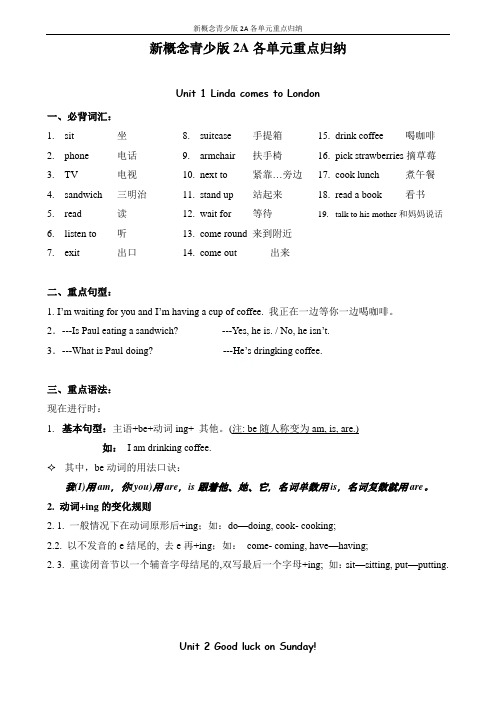
新概念青少版2A各单元重点归纳Unit 1 Linda comes to London一、必背词汇:1.sit 坐2.phone 电话 电视4.sandwich 三明治5.read 读6.listen to 听7.exit 出口8.suitcase 手提箱9.armchair 扶手椅10.next to 紧靠…旁边11.stand up 站起来12.wait for 等待e round 来到附近e out 出来15.drink coffee 喝咖啡16.pick strawberries摘草莓17.cook lunch 煮午餐18.read a book 看书19.talk to his mother和妈妈说话二、重点句型:1. I’m waiting for you and I’m having a cup of coffee. 我正在一边等你一边喝咖啡。
2.---Is Paul eating a sandwich? ---Yes, he is. / No, he isn’t.3.---What is Paul doing? ---He’s dringking coffee.三、重点语法:现在进行时:1.基本句型:主语+be+动词ing+ 其他。
(注: be随人称变为am, is, are.)如:I am drinking coffee.其中,be动词的用法口诀:我(I)用am,你(you)用are,is跟着他、她、它,名词单数用is,名词复数就用are。
2. 动词+ing的变化规则2. 1. 一般情况下在动词原形后+ing;如:do—doing, cook- cooking;2.2. 以不发音的e结尾的, 去e再+ing;如:come- coming, have—having;2. 3. 重读闭音节以一个辅音字母结尾的,双写最后一个字母+ing; 如:sit—sitting, put—putting.Unit 2 Good luck on Sunday!一、重点词汇:1.visit 参观,访问2.visitor 参观者3.noisy 嘈杂的4.village 村庄ugh 大笑6.film 电影7.say 说话8.town 市镇,城镇9.city 城市10.radio 收音机11.learn 学习12.news 新闻13.quiet 安静的14.television 电视机15.luck 运气16.center 中心e home 回家18.listen to the radio听收音机19.learn English 学习英语20.watch the news 看新闻21.play football 踢足球22.have lunch 吃午餐23.go out 外出24.hundreds of 数以百计的25.thousands of 数以千计26.look forward to 盼望,期望二、重点句型:1. --- Are Robert and Lucy waiting for a taxi? 罗伯特和露西在等出租车么?---Yes, they are. / No, they aren’t.2. ---What are Robert and Lucy doing? 罗伯特和露西在做什么?--- They are waiting for a bus. 他们正在等公交车。
新概念英语青少版-2A语法大全
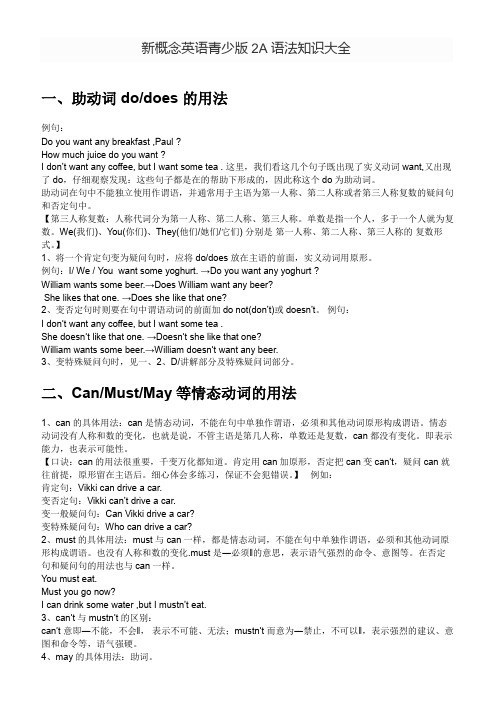
新概念英语青少版2A语法知识大全一、助动词 do/does 的用法例句:Do you want any breakfast ,Paul ?How much juice do you want ?I don’t want any coffee, but I want some tea . 这里,我们看这几个句子既出现了实义动词want,又出现了do,仔细观察发现:这些句子都是在的帮助下形成的,因此称这个do为助动词。
助动词在句中不能独立使用作谓语,并通常用于主语为第一人称、第二人称或者第三人称复数的疑问句和否定句中。
【第三人称复数:人称代词分为第一人称、第二人称、第三人称。
单数是指一个人,多于一个人就为复数。
We(我们)、You(你们)、They(他们/她们/它们) 分别是第一人称、第二人称、第三人称的复数形式。
】1、将一个肯定句变为疑问句时,应将do/does放在主语的前面,实义动词用原形。
例句:I/ We / You want some yoghurt. →Do you want any yoghurt ?William wants some beer.→Does William want any beer?She likes that one. →Does she like that one?2、变否定句时则要在句中谓语动词的前面加do not(don’t)或doesn’t。
例句:I don‘t want any coffee, but I want some tea .She doesn‘t like that one. →Doesn‘t she like that one?William wants some beer.→William doesn‘t want any beer.3、变特殊疑问句时,见一、2、D/讲解部分及特殊疑问词部分。
二、Can/Must/May等情态动词的用法1、can的具体用法:can是情态动词,不能在句中单独作谓语,必须和其他动词原形构成谓语。
青少版新概念2AUnit2.
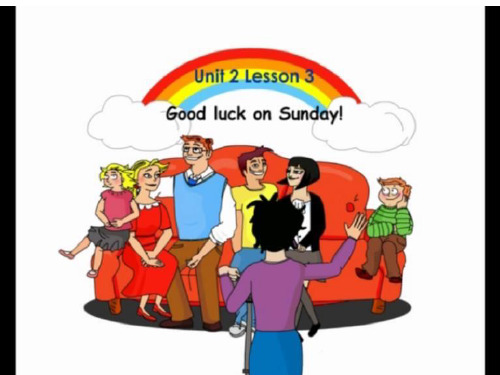
你期待周日吗?
look forward to + 现在分词 Eg: I am looking forward to visiting my grandma?
我很期盼拜访我的奶奶。
Are you looking forward to swimming on Sunday?
你很期盼周日去游泳吗? 9. say 说 say to sb. 对某人说话
There be 句型 由there加上be动词(is, are)构成,表示某人 或某物在某地;句中真正的主语是名词部分, 谓语动词和名词的数保持一致。 There is an apple in the basket. There are many eggs in the bowl. There a T-shirt and two watches in is my suitcase.
eg: My mother says to me that I must do homework.
New Words and Expressions: luck n. laugh v. 运气 大笑 reporter n. 记者 competitor n. 竞争者 centre n. 中心 listener n. 听众 visit v. 参观,访问 look forward to 期望,盼望 trade fair n. 贸易博览会 spirit n. 精神 noisy adj. film n. 电影 嘈杂的,喧闹的 hundreds of say v. 说 数以百计的 exhibitor n. town n. 参展者 市镇,城镇 thousands of city n. 城市 数以千计的 visitor n. 参观者 village n.
新概念英语青少版2A知识点整理
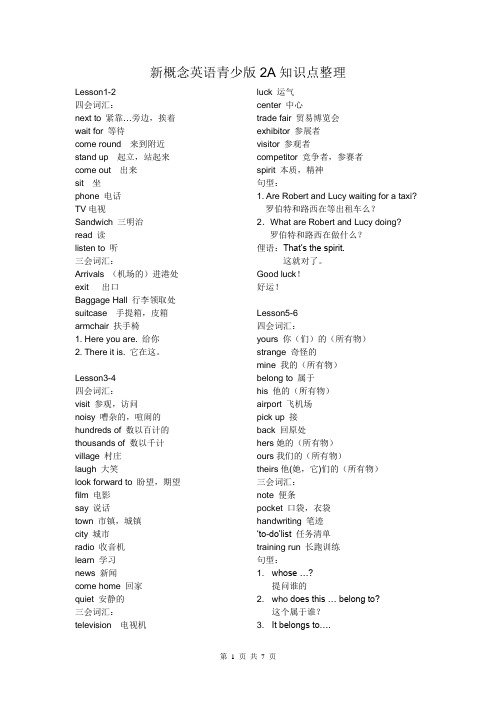
新概念英语青少版2A知识点整理Lesson1-2四会词汇:next to 紧靠…旁边,挨着wait for 等待come round 来到附近stand up 起立,站起来come out 出来sit 坐phone 电话TV电视Sandwich 三明治read 读listen to 听三会词汇:Arrivals (机场的)进港处exit 出口Baggage Hall 行李领取处suitcase 手提箱,皮箱armchair 扶手椅1. Here you are. 给你2. There it is. 它在这。
Lesson3-4四会词汇:visit 参观,访问noisy 嘈杂的,喧闹的hundreds of 数以百计的thousands of 数以千计village 村庄laugh 大笑look forward to 盼望,期望film 电影say 说话town 市镇,城镇city 城市radio 收音机learn 学习news 新闻come home 回家quiet 安静的三会词汇:television 电视机luck 运气center 中心trade fair 贸易博览会exhibitor 参展者visitor 参观者competitor 竞争者,参赛者spirit 本质,精神句型:1. Are Robert and Lucy waiting for a taxi? 罗伯特和路西在等出租车么?2.What are Robert and Lucy doing?罗伯特和路西在做什么?俚语:That’s the spirit.这就对了。
Good luck!好运!Lesson5-6四会词汇:yours 你(们)的(所有物)strange 奇怪的mine 我的(所有物)belong to 属于his 他的(所有物)airport 飞机场pick up 接back 回原处hers她的(所有物)ours我们的(所有物)theirs他(她,它)们的(所有物)三会词汇:note 便条pocket 口袋,衣袋handwriting 笔迹‘to-do’list 任务清单training run 长跑训练句型:1. whose …?提问谁的2. who does this … belong to?这个属于谁?3. It belongs to….它属于…1. let sb. do sth.2. give sb. sth. / give sth. to sb.Lesson 7-8四会词汇:hour 小时put on 穿上walk 走take off 脱下turn on 打开turn off 关掉letter 信throw away 扔掉三会词汇top three percent 最好的百分之三volunteer 自愿者Congratulations! 祝贺Well done! 做得很好!foil jacket 保暖夹克hero英雄this way 这边medal 奖章put up 挂起curtain 窗帘take down 拿下picture 图画so 非常pleased 高兴的Best wishes 最美好的祝福句型:1. Are you going to have a drink?你打算去喝些东西么?2. I’m going to have lunch.我打算去吃午餐。
2A-Unit2Lesson3GoodluckonSunday!新概念英语青少版小学英语

Marathon Expo——马拉松展览
Read and Learn
REPORTER:My name's Tom French.I'm speaking to you from the ExCel Centre in London's Docklands.We are visiting this year's Marathon Expo.
New Words
hundreds of数以百计的,以及 thousands of数以千计的。
这两个词组都是用来形容数量很多。在数量词hundred或者 thousand后面加上“s”来形容数量比较多。
New Words
hundred和thousand的前面加上基数词的时候表示一定的数 量时,不加s ,
New Words
spirit
['spirit]
n.本质,精神
town
[taun]
n.市镇,城镇
New Words
luck ,是个名词,“运气”的意思。比如我们常说“Good luck to you!"表示“祝你好运! ”。
同时大家还会经常看到luck的形容词—lucky,幸运的,好运 的,顺利的。
The Trade Fair of the London Marathon—定冠词在特 定的语境中表示特指,=“you know which I mean”(你知 道我指的是哪一个) 。
Read and Learn
REPORTER: This is the Trade Fair of the London Marathon.It's very noisy!There are hundreds of exhibitors and thousands of visitors here.
青少版新概念2a unit2

青少版新概念2a unit2《青少版新概念 2A Unit 2》在青少版新概念 2A 的 Unit 2 中,我们将开启一段新的英语学习之旅。
这一单元的内容丰富多样,充满了有趣的知识点和实用的语言表达。
首先,让我们来看看词汇部分。
Unit 2 引入了一系列与日常生活息息相关的新单词,比如“late”(迟到的)、“time”(时间)、“o'clock”(……点钟)、“catch”(赶上)等等。
这些单词看似简单,但在实际运用中却能组合出各种各样生动的句子。
通过学习这些单词,我们能够更准确地描述时间和日常活动,让我们的英语表达更加丰富和准确。
语法方面,这一单元重点讲解了一般现在时和现在进行时的用法。
一般现在时用于描述经常发生的动作或状态,而现在进行时则强调正在进行的动作。
例如,“I always get up at 7 o'clock”(我总是七点起床。
)这里使用了一般现在时来表达习惯性的动作;“She is having breakfast now”(她现在正在吃早餐。
)则运用了现在进行时来突出当下正在发生的事情。
理解和掌握这两种时态的区别和用法,对于我们正确表达英语句子的含义至关重要。
在课文部分,通过生动有趣的对话和短文,我们能够更加深入地理解新学的词汇和语法。
比如,课文中的对话可能会是关于两个朋友讨论早上的活动安排,其中一个人因为起床晚了而差点迟到,另一个人则按时完成了所有事情。
这样的情景设置让我们仿佛置身于真实的英语交流环境中,不仅能提高我们的阅读能力,还能培养我们的语感。
同时,Unit 2 还注重听力和口语的训练。
通过听录音,我们可以模仿标准的英语发音,提高自己的听力理解能力。
而口语练习则鼓励我们大胆开口说英语,将所学的知识运用到实际交流中。
例如,可以和同学进行角色扮演,模拟课文中的情景,用英语进行对话。
此外,练习部分也是这一单元不可或缺的一部分。
练习题涵盖了词汇拼写、语法选择、阅读理解、写作等多个方面,帮助我们巩固所学的知识,发现自己的不足之处,并加以改进。
- 1、下载文档前请自行甄别文档内容的完整性,平台不提供额外的编辑、内容补充、找答案等附加服务。
- 2、"仅部分预览"的文档,不可在线预览部分如存在完整性等问题,可反馈申请退款(可完整预览的文档不适用该条件!)。
- 3、如文档侵犯您的权益,请联系客服反馈,我们会尽快为您处理(人工客服工作时间:9:00-18:30)。
辅导讲义
学员姓名:Jnce2a 年级:科目: Jnce1b 学科教师:Bella 授课日期2018.6.16授课时段周六8:00-10:00
授课主题Unit Good luck on Sunday!
教学内容
课前回顾
包括上次课的课后作业讲解、单词听写、错题重现、日校答疑、重难点回顾等……
Unit
语法:people 集体名词,be动词用复数形式
1.on+具体某天
2.翻译疑问句
3.现在进行时
词汇:
visit 参观,访问noisy 嘈杂的,喧闹的hundreds of 数以百计的
thousands of 数以千计village 村庄laugh 大笑
look forward to 盼望,期望film 电影say 说话town 市镇,城镇city 城市
radio 收音机learn 学习news 新闻come home 回家quiet 安静的
television 电视机luck 运气center 中心trade fair 贸易博览会
exhibitor 参展者visitor 参观者competitor 竞争者,参赛者spirit 本质,精神
重点句型:
★ Who are waiting for a bus?
★ What are they doing? They're……
★What are sb. and sb. doing?
★ Are Robert and Lucy waiting for a taxi?
罗伯特和路西在等出租车么?
★ What are Robert and Lucy doing?
★Good luck!
作业:
1.微信熟读P.
2.背诵单词短语,下节课听写
3.完成练习册
4.每天听语音资料15分钟并大声跟读。
1。
